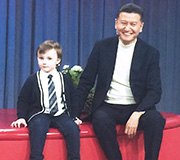In chess, there is no such thing as “early”. All parents want their children to be special. And playing chess is greatly beneficial when a child itself wants to play it. Chess develops both hemispheres of the brain. Children need to be engaged, and later life will show in what area a child is talented.
Not every chess player who played well in his childhood becomes a brilliant player. At different times, one name or another pops up, but then they quickly disappears from the horizon. Someone drops out because of too delicate nervous system, someone had no luck with a trainer, someone's talent was weak. But all of them, I assure you, have grown up as wonderful and intelligent people. Today, I will repeat with confidence: Misha is a very talented chess player. A real wunderkind.
Chess prodigies are not uncommon. Some become grandmasters over the years, others leave chess or simply remain good players. In the 19th century, Paul Morphy and Jose Capablanca were prodigies. Both of them, at the age of 12, beat adult rivals. Their names remain in chess forever. Many became grandmasters under the age of majority. Here are the most famous ones: world champions Boris Spassky, Garry Kasparov and Vladimir Kramnik (Russia), participants of the world championships Nigel Short (England), Alexander Grischuk and Alexander Morozevich (USSR, Russia), Gata Kamsky (USSR, USA). The number of chess prodigies is growing. The same Sergey Karjakin became a grandmaster at the age of 12.
 You shouldn’t worry about the future of Russian chess. Can’t Sergey Karjakin play in the tournament? It doesn't matter, soon Misha Osipov will grow up and gain all victories. Under the belt of 5-year-old prodigy are matches with Karpov, Ilyumzhinov and Averbakh...
You shouldn’t worry about the future of Russian chess. Can’t Sergey Karjakin play in the tournament? It doesn't matter, soon Misha Osipov will grow up and gain all victories. Under the belt of 5-year-old prodigy are matches with Karpov, Ilyumzhinov and Averbakh...






















